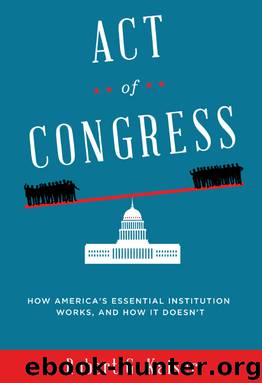Act of Congress by Robert G. Kaiser

Author:Robert G. Kaiser [Kaiser, Robert G.]
Language: eng
Format: epub
ISBN: 978-0-307-96218-8
Publisher: Knopf Doubleday Publishing Group
Published: 2013-05-07T04:00:00+00:00
At two o’clock in the afternoon of December 10, the House reconvened to consider amendments to the bill. But first, two more votes were necessary. The first vote was on a second waiver of the rule requiring a two-day wait between Rules Committee action and floor consideration of a bill, this time for the rule on consideration of amendments. One hour was taken up with that, though again, members talked mostly about the bill itself, not the waiver. A second hour was devoted to debating the rule on amendments, which stipulated how they would be considered, for how long and in what order. Yet again, the discussion was mostly about the bill. Some Republicans used the opportunity to complain about amendments they had offered that the Rules Committee (really the leadership, as we have seen) refused to make in order. Roll call votes, each taking fifteen to twenty minutes, were tallied on both of these measures; both got virtually unanimous Democratic support; no Republican voted for either one.
At 4:25 p.m. the full House, sitting again as the committee of the whole, began to consider the amendments that had been approved, or ruled in order. A five-minute rule was in effect for most of them, so they were speedily dispatched. For the next six hours, amendments were considered. Many were technical and were enacted by voice vote. A few made substantive changes in the bill. One was the Bean compromise on preemption, included in Frank’s manager’s amendment, though its true significance was far from clear. Frank and the Obama administration both thought it was essentially meaningless.
Scott Murphy, a New York Democrat, offered an amendment favored by the National Association of Manufacturers and many big corporations that allowed somewhat more room for customized derivatives that they used to hedge commercial risks. Some liberals thought the Murphy amendment significantly compromised the bill, but this too was far from clear. Frank proposed an amendment to try to strengthen regulators’ hands when dealing with such derivatives, but it was defeated. In both votes, New Dems and Blue Dogs mostly voted with the big companies that wanted the changes that Murphy proposed and opposed Frank’s, a reminder that the liberal house leadership could not always count on their moderates’ votes. But Frank insisted that the defeats he suffered were relatively minor. The House adjourned after 10 p.m., the second late session in a row.
The most important amendment, Minnick’s attempt to abolish the CFPA, came up on Friday morning, December 11, the last day of the debate. Minnick proposed creating a new council of regulators with twelve members to oversee consumer protection efforts by every existing regulatory agency. In addition, the regulators would have to create new divisions of consumer protection. Minnick said this was a better idea than creating a new agency that would have to share responsibility for overseeing financial institutions with the traditional regulators. His critics, including Frank, said it was a bureaucratic monstrosity that wouldn’t work.
The key moment in the debate on the Minnick amendment came when Melissa Bean of Illinois rose to speak.
Download
This site does not store any files on its server. We only index and link to content provided by other sites. Please contact the content providers to delete copyright contents if any and email us, we'll remove relevant links or contents immediately.
| Anthropology | Archaeology |
| Philosophy | Politics & Government |
| Social Sciences | Sociology |
| Women's Studies |
The Secret History by Donna Tartt(19090)
The Social Justice Warrior Handbook by Lisa De Pasquale(12190)
Thirteen Reasons Why by Jay Asher(8910)
This Is How You Lose Her by Junot Diaz(6887)
Weapons of Math Destruction by Cathy O'Neil(6281)
Zero to One by Peter Thiel(5802)
Beartown by Fredrik Backman(5754)
The Myth of the Strong Leader by Archie Brown(5508)
The Fire Next Time by James Baldwin(5446)
How Democracies Die by Steven Levitsky & Daniel Ziblatt(5219)
Promise Me, Dad by Joe Biden(5153)
Stone's Rules by Roger Stone(5088)
A Higher Loyalty: Truth, Lies, and Leadership by James Comey(4964)
100 Deadly Skills by Clint Emerson(4926)
Rise and Kill First by Ronen Bergman(4789)
Secrecy World by Jake Bernstein(4753)
The David Icke Guide to the Global Conspiracy (and how to end it) by David Icke(4720)
The Farm by Tom Rob Smith(4514)
The Doomsday Machine by Daniel Ellsberg(4490)
